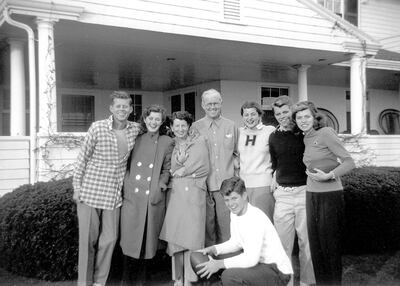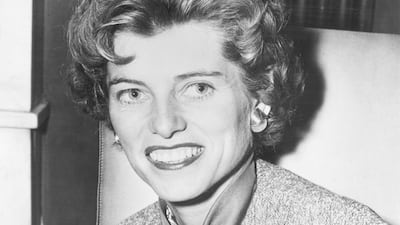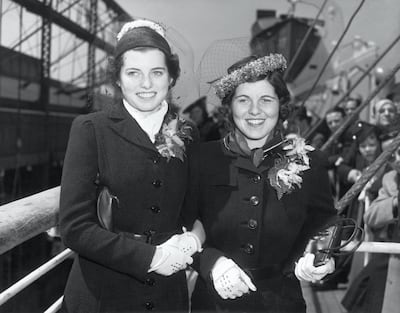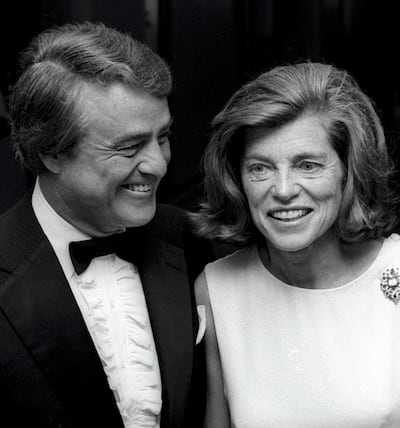On Thursday night, more than 40,000 people will take their places inside Zayed Sports City Stadium to watch the opening ceremony of the Special Olympics World Games, with the UAE hosting the competition for the first time in the Middle East. Celebrities and sporting figures, from pop star Avril Lavigne to American former Olympian Bob Beamon, will welcome 7,500 athletes from 190 nations to Abu Dhabi, making it the most diverse Games in its 50-year history.
Its roots can be traced back to one woman: Eunice Kennedy Shriver.
Born in 1921, she was the fifth of Joseph and Rose Kennedy's nine children and one of four girls destined to live in the shadows of the male members of the family. Eunice's existence is described by journalist and author Eileen McNamara as "invisible or interchangeable" in Eunice: The Kennedy Who Changed The World, the first biography to detail the life of the woman who transformed the lives of many people with intellectual disabilities.
Eunice was known for her persistence and she wouldn't accept being simply a decorative accessory to the ambitions of her father and brothers, explains McNamara, although she had a close relationship with her brother John and supported his presidential campaign in 1960. But she wanted more. From a young age, she fought to be seen in a male-dominated world – playing touch football, a variant of American football, with her brothers, and joining the men at after-dinner parties to talk politics. "Throughout her life, she pushed her way into rooms where decisions got made, influencing policy across nine presidential administrations," writes McNamara.
Writing women back into history
Despite Eunice's tenacity, the Kennedy sisters largely remained a silent backdrop in the tale of one of America's most storied families. Even the formation of the Special Olympics has been "treated as a nice philanthropic gesture by a famous heiress, instead of a revolutionary change in public policy achieved by a brilliant political strategist", explains McNamara. That's something the Pulitzer-winning journalist hopes to change by writing Eunice's story. "I think it's all too easy to write women out of history," she says.
Eunice's sister Rosemary, who was born three years earlier, had intellectual disabilities. Eunice was fiercely protective of her and that motivated the younger sister to try to change the public perception of mentally disabled people. The sisters sailed together at Hyannis Port, near the family home in Massachusetts, played tennis and toured Europe together. But in 1941, without the consent of the family, Eunice's father had Rosemary lobotomised.
Whether this was to safeguard the Kennedy image from his daughter's disabilities or a genuine attempt to help her is up for debate, but the operation left Rosemary, then 23, unable to walk or talk. Afterwards, the Kennedy siblings were forbidden by their father to visit their sister, and Eunice had no contact with her for more than a decade.
In the meantime, Eunice graduated from Stanford University and set aside her desire to be a nun, which McNamara believes was another case of a Kennedy woman making a sacrifice for the sake of the image of Kennedy men: "No doubt the optics of a 5-foot-10-inch [177 centimetre] Kennedy sister in full-length black habit and veil would not have served JFK politically when he was running for president in a country already suspicious of the Catholic faith." Instead, Eunice began a career in public service.
Before any of her brothers' political careers took flight, she was laying foundations for social change. "In 1945, two years before Jack [JFK] arrived on Capitol Hill, she began working with the State Department. She had administered a task force on juvenile delinquency 14 years before Bobby tackled the same as attorney general. And she worked with women in a federal prison 25 years before Ted took on prison reform in the senate," explains McNamara.
A new chapter
At the will of her father, Eunice married Robert Sargent Shriver in 1953, and the future founder of the Peace Corps became her lifelong partner in both work and love. They had five children: Bobby, Maria, Timothy, Mark and Anthony.
Not long after Eunice's marriage, her father had a stroke, and it was then that she began the process of bringing her exiled sister back into the family fold. Eunice was perhaps driven by the guilt of having so easily followed instructions to erase her sister from her life, but she was also inspired by rage, McNamara says. "She was motivated as well by how few services were available for children with intellectual disabilities. Until JFK was elected president, these children had no right to a public school education, a home or a job in the community."
Instead, people were sent to what McNamara describes as "Dickensian facilities", where they were hidden from society. Eunice knew that needed to change, and so set about using both her wit and her famous surname to make sure it did. After taking charge of the family charity foundation, Eunice used it to help initiate change for children with intellectual disabilities. In 1962, she launched a summer camp in her back garden. Working with special schools and clinics to source the names of children in Maryland who might benefit from the camp, she recruited high-school pupils and college students to act as counsellors. That summer, Camp Shriver was born, and 31 children swam, rode horses and had fun. It represented the early beginnings of the Special Olympics World Games.
A year later, JFK was assassinated and the nation mourned the death of a president, as the Kennedys grieved for a family member. Eunice stayed strong, says McNamara. "Her influence did not end on that awful day in Dallas. She was bent but not broken by her brother's assassination."
Less than five years later in Chicago, the first international Special Olympics Summer Games took place. It was an occasion that began a transformation for millions of people across the globe, and was one of Eunice's proudest achievements.
Change for the better
But for McNamara, who spent seven years researching, working with archives, reading letters, visiting the cities in which Eunice lived, and interviewing friends, family and colleagues across the country, the Games isn't her only legacy. "Today, there is a federally funded National Institute of Child Health and Human Development in Washington DC that did not exist until 1962, when Eunice convinced President Kennedy it was vital to research birth defects, prenatal development, early infancy and maternal health," she says.
“Just two months before President Kennedy was assassinated, his wife gave birth prematurely to a son, Patrick, who died of hyaline membrane disease. Today, very few infants die of that and that’s down to the research conducted at that institute, which is now named after Eunice Kennedy Shriver.”
McNamara also refers to a wealth of stories that are often glossed over because Eunice was seen as a second-class Kennedy, simply because she was a woman. She suffered through long bouts of ill health, survived a high-speed car crash and tropical storm, and maintained an unwavering faith in God despite the death of four of her siblings and her husband's battle with Alzheimer's disease.
Along the way, Eunice earned a wealth of awards, including the US Presidential Medal of Freedom, the World Sports Humanitarian Hall of Fame's Founder's Award and nine honorary degrees. At her 80th birthday party, then president George W Bush said: "If you ever had any doubt about how much good one person can do, look no further than this kind and gracious lady."

Her own path
And yet, in many ways, Eunice was an anti-Kennedy. "Her work upended her father's dictum that only first-place finishers count. Her religiously fuelled activism eclipsed her mother's passive piety," says McNamara.
Unafraid of flouting convention, Eunice drove wildly, parked where she wanted to, had unkempt hair and was a terrible host. Newspaper columnist Joe Alsop wrote that when he visited her house to have dinner, there was "no one at home, chairs overturned from a football-passing contest, and a half-eaten sandwich on the mantelpiece".
She was routinely described as formidable, and McNamara discovered letters and stories that proved Eunice was also "impatient to a fault. But that same persistence was also her greatest strength. She was relentless. She did not give up until she got what she wanted."
Biographer Scott Stossel spent seven years writing about Eunice's husband, but was also fascinated by her. He says in The Atlantic that she was "brusque, abrupt-to-the-point-of-rudeness, and mercilessly direct in asking something of a policymaker (in the early 1960s, President Kennedy would joke to Bobby Kennedy, 'Let's give Eunice whatever she wants so I can get her off the phone and get on with the business of the government'). And then five minutes later she could be warm and encouraging in her interaction with a Special Olympics athlete with Down syndrome."
Despite founding the Games, pushing politicians to fund programmes for maternal and child health, and securing political acts that made discrimination against people with disabilities illegal, Eunice's work was never finished.
No end in sight
At the first Special Olympics, she said: "We have miles to go to overturn the prejudice and oppression facing the world's 180 million citizens with intellectual disabilities."
She pushed on for many more miles. In 2008, and with her health failing, Eunice hosted the Grand Finale Best Buddies Ball, an event to help people with intellectual disabilities that was run by her son Anthony's non-profit organisation. The party attracted a wealth of celebrities including Randy Jackson, Robert De Niro and Kenny G but, as the guests mingled, Eunice retreated to her bedroom with her old friend Lowell Wyker. The pair didn't talk about Eunice's health. Instead, they spoke about the future, about contacting the right senators, about making amendments to the newly passed American with Disabilities Act. Eunice was working to the very end.

Ten months later, Eunice died, only two weeks before her brother Teddy. Their funerals showed the disparity between the life of a Kennedy man and that of a Kennedy woman. "Teddy would lie in repose at the John F Kennedy Presidential Library before a Requiem Mass in Boston's grandest basilica," writes McNamara in the closing chapter of Eunice. Barack Obama delivered his eulogy and three former US presidents attended the Mass.
By contrast, Eunice's funeral was held at a small church in Cape Cod. As her casket was lowered into the ground, several Special Olympics athletes tossed their gold medals on to her coffin. It was a fitting seal to the legacy of a Kennedy woman whose relentless persistence in a man's world helped to change the lives of millions.




